The Rough Guide to Italy marks the location of Civita Castellana in its introductory legend of Rome and Lazio, but treats it in such a stingy way that does not have a word on it. I believe it is unfair to Civita Castellana.
|
 |
 |
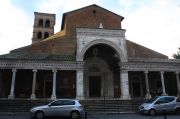 |
 |
 |
 |
 |
 |
Cathedral of Civita Castellana
 |
 |
The first settlement of Civita Castellana could be traced back to the Iron Age by a tribe of Italic called Falisci, from which it took its original name Falerii Veteres. But with the Roman conquer it was renamed Falerii Novi (today you can still find the town on the map) and rebuilt the town 5 km away in a flat land which was very difficult to protect, and then in the early middle ages the abandoned old town was rebuilt in order to defend the barbarian raids. It was at that time that the town began to use its present name Civita Castellana (in 994). For centuries the town has been the property of the Papal State. Civita Castellanna is in all senses a traditional medieval town. This medieval nature can be testified by not only the history, but also its ancient heritage.
Via Flaminia is just passing the foot of the hill where Civita Castellana is built on and then heading north for Otricoli, Umbria. Wikipedia says and I quotes that "Civita Castellana became an important road hub with the connection to the Via Flaminia (1606) and the construction of Ponte Clementino after the French victory against a Neapolitan army in 1709". Today Civita Castellana remains to be biggest town along Via Flaminia after the road runs out of Rome, but with the importance of the ancient road is being taken over by the highway from Rome to Florence, the town is also losing its own weight.
Today Civita Castellana can be divided into two parts with Clement Bridge as the border line between the two: the new town and the historic center. After reading my series of report on Via Flaminia, you may catch Italians' strategy or methodology on the sustainable development of historic places. I understand that they keep the old things as much as they can, meanwhile they build new buildings next to the old towns.
[Continue]
|
|
| Favourite spots: |
 |
 |
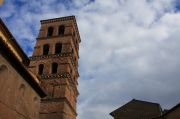 |
 |
 |
 |
 |
 |
Bell tower of the Cathedral
 |
 |
The new town is not interesting at all, you may just skip it. The historic center is not big enough for you to hang around the whole day there, but anyway if you want to have a complete picture of Civita Castellana, you need a half day to finish all the interesting places.
1. Cathedral (Duomo)
The Cathedral is called Santa Maria Maggiore and is dedicated to the Virgin Mary. It has a very interesting portico with a higher porch in the center with four shorter porches at its each side. There are several doorways to the church, but the main entrance has a very nice facade, with delicate decoration. The airy Portico also serves as an archaeological musuem and many ancient excavations are displayed there. It is also a good place for marketing, when I got there, an exhibition for children staffs was being held, a little bit crowded but best place to do that, because outside it was raining.
There are some very nice frescoes in the church, but I like three things more.
[continue]
|
|
| What's really great: |
 |
 |
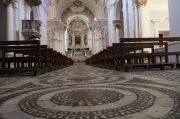 |
 |
 |
 |
 |
 |
3 things inside the church are my favorite
 |
 |
One is the atmosphere inside of the church. It is quite refreshing and bright, not like some other churches I had visited, dark and dull. The other is the main altar, which is decorated with white flowers, solemn but beautiful. The third thing is the ground floor with beautiful mosaics, making the church look very elegant.
There is another great thing inside the church, but unfortunately I missed it. Actually I visited the town twice, but the first time it was late, so I decided just to have a quick look and return tomorrow, I found a basement with nice collections of statues and mosaics, but when the second time I got there, I could not find the basement any more. I even doubted whether something wrong with my memory, but when I got back and checked the pictures taken in the first time, I found I was right, there does exist such a basement! But I really did not know where it is, probably at the left side of the main altar. I am getting old.
[continue]
|
|
| Sights: |
2. Sangallo Fortress
Sangallo Fortress or Forte Sangallo in Italian is in the vicinity of the cathedral. It was built by the famous architure in the renaisance period, Antonio da Sangallo the old under the commission of Pope Alessandro VI. It served for military purposes first, and then was changed into a papal residence and after that a prison for many years.
The Sangallo Fortress also houses an museum and tour guide service is provided, the most important thing is that it is free. The tour guide that I had is called Claudio, he seemed to be very proud of his job and tried to explain in every possible way to make me really understand what he said. The interior of the fortress is also impressive, it has a big ward with nice cloisters which remind me of the one that I saw in Spoleto. The collection of museum is also excellent, including some nice potteries from Greece and Egypt.
[continue]
|
|
| Accommodations: |
3. the main square
The main square where the town hall is located is called Piazza G. Matteotti. But I would rather say it is a big parking lot than a interesting place to hang around. The main sight is a fountain, nothing else.
4. Clementino Bridge
The bridge is very important both historically and presently. It is where the historic center and the new town are connected, and it seems to be the only way from the new town to the historic center. It is impressively high with verdent trees coving the valley, at the very end you may see a little river trickle away.
5. other nice places
Besides the cathedral, there are two churches deserving a visit. Chiesa del Camine is just lying on the main road leading to outside of the town. It is very simple with a very nice bell tower.
Chiesa San Giacomo looks also quite humble both in its apperance and its interior. It is quite dark and the air is not very fresh, not the one that I like.
[continue]
|
|
| Nightlife: |
 |
 |
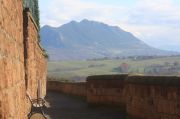 |
 |
 |
 |
 |
 |
Via del Tiratore, best postion for making pictures
 |
 |
6. nice places for making wonderful pictures
There are two places for taking pictures. One is called via del Tiratore. It is a small side road Sangallo Fortress, but it is a good place to overlook the valley as well as to have a better positon for taking the pictures of the Fortress.
|
|
| Hangouts: |
The other place is also good for hanging out around the town. It is called Via del Belvedere, which is just at the foot of the wall and the fortress. Therefore it is probably, as its name indicates "Road of Good View", the best postion for photographing. If time allows, suggest you to walk a little around the town, it will be a nice thing to do.
There are several streets inside the town also very nice. One is called Via Garibaldi connecting the cathedral with the main square, Piazza G. Matteotti, full of people and shops. The other one is Via Roma, connecting the cathedral with the Sangallo Fortress. Two things deserve a visit, one is a fountain just at the right corner of the cathedral, the other is a monument erected at the entrance to the town, but I could not find anything about their stories, therefore I was not able to tell you anything more than that.
[continue]
|
|
| Restaurants: |
[Continue]
I made incredibly beautiful pictures along Via Flaminia from Civita Castellana. When I passed it, it was still pretty early and had a very heavy fog. I was not quite sure whether I was on the right way, I found some firemen standing on an entrance to a road, then I stopped the car to ask for a help. They told me that it was the right direction, I just kept on it and would be in Otricoli soon. But after I was tempted by what I found, a "river" was overflooding and the road was drown, the firemen were there to stop people passing on this road. The trees and their shadow in the river are just for pictures, and I stopped there for a while and made loads and loads pictures.
Around the noon time when I came back from Otricoli, the weather was very nice and quite shiny, I found the firemen who were very friendly to me were still there. But after the heavy fog gone, I realized that the river that I found in the morning was not a river, it was the rainwater making the land a pond.
|
|
| Other recommendations: |
 |
 |
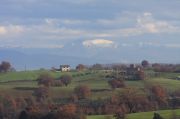 |
 |
 |
 |
 |
 |
Surroundings of Civita Castellana
 |
 |
1. Civita Castellana could be visited together with those small towns that I introduced in my last travel report, Morlupo, Rignano Flaminio, Sant'Oreste, they are very close to each other, but Otricoli is a little far from it. Therefore I could include it in my last report, but I found it would be unfair for Civita Castellana if I did not have an individual travel report on it. It is a nice town receiving less attention from travellers.
2. I have uploaded an album for civita castellana, it will be very helpful for you to understand this beautiful town better.
|
|
Published on Wednesday December 17th, 2008
|
|
 Publish on Facebook
Publish on Facebook
|
Tue, Jan 06 2009 - 12:06 PM
 by davidx
| I agree absolutely with the comments already made. I love the way you concentrate on leser known places - and it's more than following the VF, great as that is but you go off route to towns of interest. |
Wed, Dec 17 2008 - 04:42 AM
 by jorgesanchez by jorgesanchez
Wed, Dec 17 2008 - 12:33 AM
 by pesu by pesu
| Hi, 'old' Yuliang, your reports are even getting better and better - congratulations! |
| Information: |
| Login if you are a member, or sign up for a free membership to rate this report and to earn globo points! |
|

|
